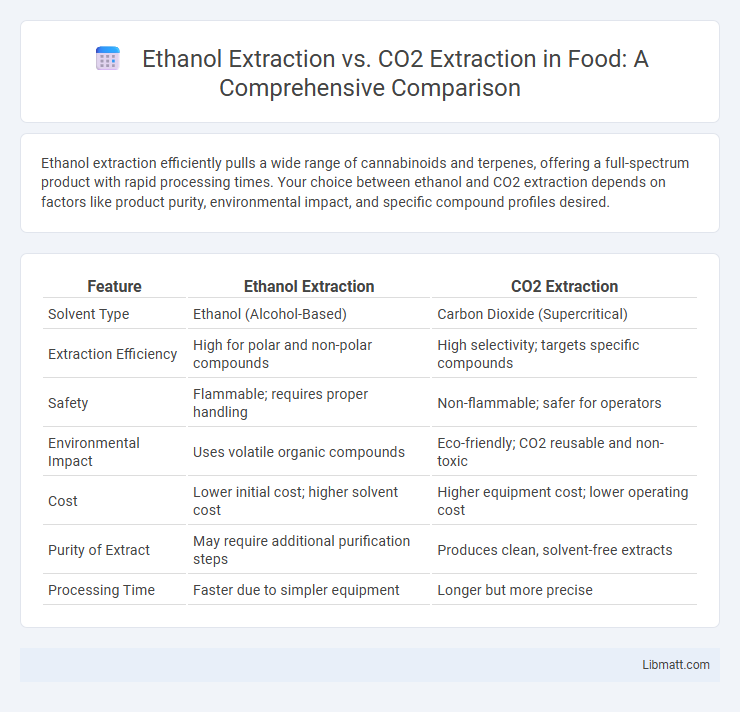Ethanol extraction efficiently pulls a wide range of cannabinoids and terpenes, offering a full-spectrum product with rapid processing times. Your choice between ethanol and CO2 extraction depends on factors like product purity, environmental impact, and specific compound profiles desired.
Table of Comparison
| Feature | Ethanol Extraction | CO2 Extraction |
|---|---|---|
| Solvent Type | Ethanol (Alcohol-Based) | Carbon Dioxide (Supercritical) |
| Extraction Efficiency | High for polar and non-polar compounds | High selectivity; targets specific compounds |
| Safety | Flammable; requires proper handling | Non-flammable; safer for operators |
| Environmental Impact | Uses volatile organic compounds | Eco-friendly; CO2 reusable and non-toxic |
| Cost | Lower initial cost; higher solvent cost | Higher equipment cost; lower operating cost |
| Purity of Extract | May require additional purification steps | Produces clean, solvent-free extracts |
| Processing Time | Faster due to simpler equipment | Longer but more precise |
Introduction to Extraction Methods
Ethanol extraction uses high-proof alcohol to dissolve cannabinoids and terpenes from cannabis plant material, offering efficient recovery and preserving a broad spectrum of compounds. CO2 extraction employs supercritical carbon dioxide under specific temperature and pressure conditions, enabling precise control over the extraction process and producing a clean, solvent-free concentrate. Both methods are widely utilized in the cannabis industry for extracting high-quality oils but differ in solvent safety, extraction speed, and equipment costs.
What is Ethanol Extraction?
Ethanol extraction uses high-proof ethanol to dissolve cannabinoids and terpenes from cannabis or hemp plant material, effectively separating desired compounds from fibers and waxes. This method operates at room temperature or slightly warmed conditions, preserving the plant's phytochemicals while offering a cost-effective solution for large-scale production. Your choice of ethanol extraction can impact the final product's purity, potency, and flavor profile compared to CO2 extraction techniques.
What is CO2 Extraction?
CO2 extraction is a method that uses supercritical carbon dioxide as a solvent to extract essential oils and active compounds from plants. This technique offers precise control over temperature and pressure, enabling efficient separation of desired constituents without residual solvents. Your choice between CO2 extraction and other methods like ethanol extraction can impact product purity, potency, and overall quality.
Key Differences Between Ethanol and CO2 Extraction
Ethanol extraction uses a polar solvent that efficiently dissolves cannabinoids and terpenes but may also extract chlorophyll, impacting taste and color. CO2 extraction employs pressurized carbon dioxide as a solvent, enabling precise control of temperature and pressure to selectively isolate desired compounds with minimal impurities. While ethanol extraction offers faster processing and lower equipment costs, CO2 extraction provides a cleaner product with better preservation of delicate terpenes and is favored for producing high-purity cannabis concentrates.
Efficiency and Yield Comparison
Ethanol extraction offers high efficiency by rapidly dissolving a broad spectrum of cannabinoids and terpenes, resulting in a higher overall yield compared to CO2 extraction. CO2 extraction provides precise control over temperature and pressure, enabling selective targeting of specific compounds but often produces a lower yield due to its slower process and limited solvent power. While ethanol maximizes extraction volume, CO2 excels in producing purer extracts with minimal residual solvents, balancing yield with quality.
Safety Considerations in Both Methods
Ethanol extraction poses flammability risks due to the solvent's volatility, requiring strict handling protocols and proper ventilation to ensure operator safety. CO2 extraction operates under high pressure, necessitating robust equipment to prevent accidents and regular maintenance to avoid leaks or malfunctions. Both methods demand adherence to safety standards, but CO2 extraction offers a non-flammable alternative with lower residual solvent concerns.
Purity and Quality of Extracts
Ethanol extraction delivers high-purity extracts by efficiently dissolving cannabinoids while preserving essential terpenes, making it ideal for products requiring rich flavor profiles and potency. CO2 extraction offers superior control over temperature and pressure, producing clean, solvent-free extracts with minimal chlorophyll content for enhanced purity and smoothness. Your choice between these methods impacts the overall quality, potency, and safety of the final product, crucial for medical and recreational applications.
Cost Analysis: Ethanol vs CO2 Extraction
Ethanol extraction generally offers a lower upfront cost due to simpler equipment and faster processing times, making it more accessible for small to mid-scale operations. CO2 extraction involves higher initial investment and maintenance expenses but provides greater precision and purity, which can result in higher-quality end products. Your choice between these methods depends on balancing budget constraints with desired product quality and operational efficiency.
Environmental Impact of Each Method
Ethanol extraction often relies on large volumes of chemical solvents that can pose environmental risks if not properly managed, including solvent disposal concerns and potential soil contamination. CO2 extraction uses supercritical carbon dioxide, which is non-toxic, non-flammable, and can be recycled within closed-loop systems, significantly reducing environmental impact and solvent waste. The energy consumption for CO2 extraction can be higher, but its environmental footprint remains lower due to reduced chemical usage and safer waste handling.
Choosing the Right Extraction Technique
Choosing the right extraction technique depends on the desired purity, efficiency, and end product application. Ethanol extraction offers a cost-effective, versatile method ideal for extracting a broad spectrum of cannabinoids and terpenes, while CO2 extraction provides a solvent-free, precise process that produces high-purity concentrates with better control over temperature and pressure. Your decision hinges on factors like production scale, product quality requirements, and environmental considerations.
Ethanol Extraction vs CO2 Extraction Infographic

 libmatt.com
libmatt.com